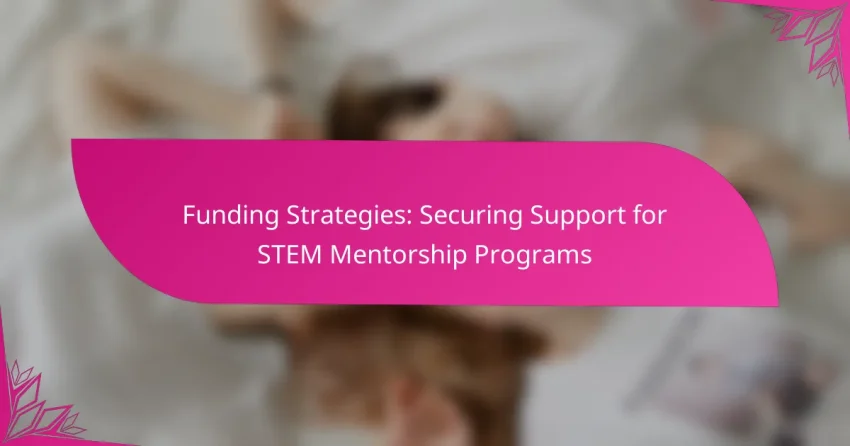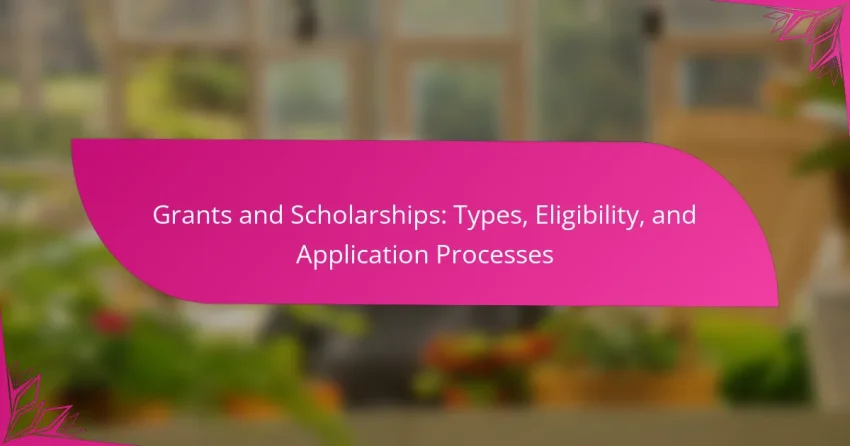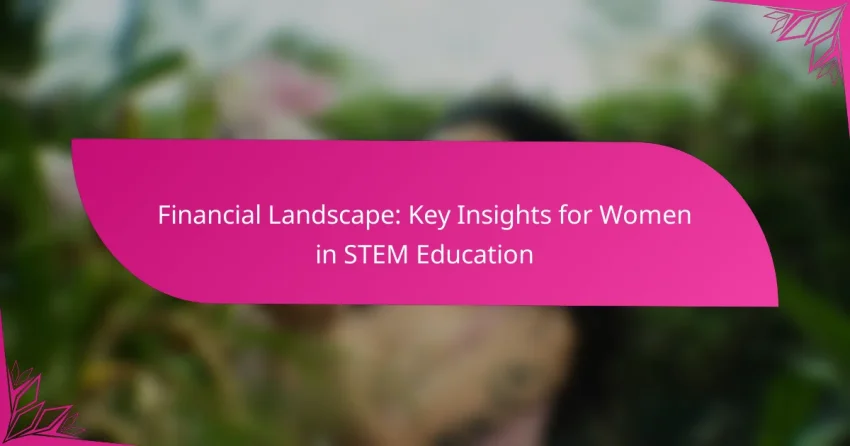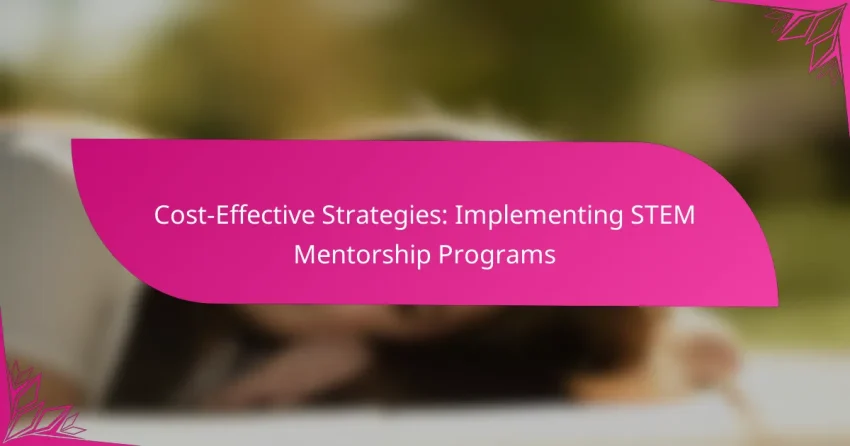Securing funding for STEM mentorship programs is essential for their sustainability and growth. Effective strategies include leveraging grants, corporate sponsorships, community fundraising, and crowdfunding platforms, each offering distinct advantages. By evaluating potential funding sources based on alignment with program goals and accountability requirements, organizations can ensure they effectively support their initiatives while advancing their mission….
Category: STEM Mentorship Programs for Women: Funding and Resources
STEM mentorship programs for women play a crucial role in fostering female participation in science, technology, engineering, and mathematics fields. These initiatives offer valuable resources, networking opportunities, and guidance to help women excel in their careers. Additionally, various funding options such as grants and scholarships are available to support their involvement in these programs, making it essential for participants to explore and understand the application processes and eligibility criteria.
Grants and Scholarships: Types, Eligibility, and Application Processes
Grants and scholarships play a crucial role in helping students finance their education in the United States. With various types available, including federal, state, and private options, each comes with its own eligibility requirements and application processes. Understanding these distinctions and the necessary steps for applying can enhance your chances of securing financial aid. What…
Financial Landscape: Key Insights for Women in STEM Education
The financial landscape for women in STEM education is rich with opportunities, including scholarships, grants, and federal funding programs tailored to support their academic and professional journeys. However, challenges such as gender bias in funding and underrepresentation in leadership roles persist, highlighting the need for targeted resources and mentorship. By leveraging available financial resources and…
Cost-Effective Strategies: Implementing STEM Mentorship Programs
Implementing cost-effective STEM mentorship programs is essential for fostering the next generation of innovators while maximizing available resources. By utilizing virtual platforms and collaborating with local universities and community organizations, these programs can provide valuable guidance and real-world experiences to students without incurring significant expenses. Ultimately, these initiatives enhance student engagement and career readiness in…
What are the best STEM mentorship programs for women in the US?
Some of the best STEM mentorship programs for women in the US include the Society of Women Engineers Mentorship Program, Girls Who Code Summer Immersion Program, Women in Technology International Mentoring Program, National Girls Collaborative Project, and Techbridge Girls Program. These programs provide valuable resources, networking opportunities, and guidance to help women excel in STEM fields.
Society of Women Engineers Mentorship Program
The Society of Women Engineers (SWE) Mentorship Program connects women in engineering with experienced professionals in the field. Participants can benefit from one-on-one mentoring relationships that focus on career development, networking, and skill enhancement.
This program is designed for women at various stages of their careers, from students to seasoned professionals. Mentors offer insights into navigating the engineering landscape and can help mentees set and achieve their career goals.
Girls Who Code Summer Immersion Program
The Girls Who Code Summer Immersion Program is a free, seven-week program for high school girls interested in computer science. Participants engage in hands-on projects, learn coding skills, and receive mentorship from women in tech.
This program not only teaches technical skills but also fosters a supportive community. Participants can expect to work on real-world projects, enhancing their resumes and building confidence in their abilities.
Women in Technology International Mentoring Program
The Women in Technology International (WITI) Mentoring Program pairs women in technology with mentors who can provide guidance and support. This program focuses on professional growth, leadership development, and networking opportunities.
Mentors and mentees meet regularly to discuss career paths, challenges, and strategies for success in the tech industry. The program is open to women at all levels, making it a versatile option for those seeking mentorship.
National Girls Collaborative Project
The National Girls Collaborative Project (NGCP) aims to increase the participation of girls in STEM through collaboration among organizations. It provides resources, networking opportunities, and support for programs that encourage girls to pursue STEM careers.
NGCP connects educators, mentors, and organizations to share best practices and resources. This collaborative approach helps create a stronger support system for girls interested in STEM fields.
Techbridge Girls Program
The Techbridge Girls Program focuses on empowering girls from low-income communities to pursue STEM education and careers. The program offers hands-on learning experiences, mentorship, and resources to help girls build confidence in their abilities.
Participants engage in STEM activities that are both educational and fun, fostering a love for science and technology. The program also emphasizes the importance of role models, connecting girls with women in STEM who can inspire and guide them.
How can women access funding for STEM mentorship programs?
Women can access funding for STEM mentorship programs through various grants, fellowships, and scholarships specifically designed to support their participation in science, technology, engineering, and mathematics fields. These funding opportunities often require an application process and may have specific eligibility criteria, so it’s essential to research each option thoroughly.
National Science Foundation Grants
The National Science Foundation (NSF) offers several grant programs aimed at increasing participation of women in STEM. These grants can fund mentorship initiatives, research projects, and educational programs. Applicants should focus on demonstrating the potential impact of their projects on women’s advancement in STEM fields.
To apply, organizations typically need to submit a detailed proposal outlining their objectives, methodologies, and expected outcomes. It’s advisable to review the NSF’s guidelines and deadlines carefully to ensure compliance and increase the chances of funding approval.
American Association of University Women Fellowships
The American Association of University Women (AAUW) provides fellowships that support women pursuing graduate studies in STEM fields. These fellowships can cover tuition and living expenses, allowing recipients to focus on their studies and mentorship activities. The AAUW emphasizes projects that promote equity and education for women and girls.
Applicants must provide a clear plan for how their work will contribute to the advancement of women in STEM. The application process includes submitting transcripts, letters of recommendation, and a personal statement, so early preparation is crucial.
Google Women Techmakers Program
The Google Women Techmakers Program aims to provide visibility, community, and resources for women in technology. This program includes scholarships for women pursuing computer science degrees and offers mentorship opportunities through workshops and networking events. Participants gain access to a global network of women in tech, enhancing their professional growth.
To benefit from this program, applicants should demonstrate their commitment to technology and leadership. Engaging with the community through events and online platforms can also strengthen their application and provide valuable connections.
Women in STEM Scholarship Programs
Various organizations and universities offer scholarships specifically for women in STEM disciplines. These scholarships can significantly reduce educational costs and often come with additional resources such as mentorship and internship opportunities. Examples include the Society of Women Engineers scholarships and the STEM Scholarship Program by the National Center for Women & Information Technology.
When applying for these scholarships, candidates should highlight their academic achievements, leadership experiences, and commitment to pursuing a career in STEM. It’s beneficial to apply to multiple programs to increase the chances of receiving funding.
What resources are available for women in STEM mentorship?
Women in STEM can access a variety of resources designed to support mentorship, including online platforms, local organizations, and educational events. These resources provide networking opportunities, guidance, and training to help women advance in their careers.
Online Networking Platforms
Online networking platforms serve as vital resources for women in STEM, allowing them to connect with mentors and peers globally. Websites like LinkedIn, ResearchGate, and specific STEM-focused platforms facilitate discussions, share job opportunities, and foster professional relationships.
When using these platforms, it’s essential to create a strong profile that highlights your skills and interests. Engaging actively in relevant groups and discussions can enhance visibility and attract potential mentors.
Local STEM Organizations
Local STEM organizations often provide mentorship programs tailored to women, offering both formal and informal networking opportunities. These organizations may host events, workshops, and meetups that encourage collaboration and knowledge sharing among women in various STEM fields.
To find local organizations, consider searching for chapters of national groups like the Society of Women Engineers or Women in Technology. Participating in these organizations can lead to valuable connections and resources specific to your region.
Webinars and Workshops
Webinars and workshops are excellent resources for women seeking mentorship in STEM. These events often cover a range of topics, from technical skills to career development, and provide opportunities to interact with industry leaders and experts.
Look for webinars hosted by universities, professional associations, or industry leaders. Many of these events are free or low-cost, making them accessible. Engaging in Q&A sessions during these events can also help establish connections with potential mentors.
What criteria should women consider when choosing a mentorship program?
Women should evaluate mentorship programs based on their reputation, mentor qualifications, and the structure and support offered. These factors can significantly impact the effectiveness of the mentorship experience and the potential for personal and professional growth.
Program Reputation
The reputation of a mentorship program can provide insights into its effectiveness and the quality of its mentors. Look for programs with positive reviews, testimonials from past participants, and recognition from reputable organizations in the STEM field.
Researching the program’s history and success stories can also help gauge its impact. Programs that have been established for several years and have a track record of successful alumni are often more reliable choices.
Mentor Qualifications
Assessing the qualifications of mentors is crucial for ensuring a valuable mentorship experience. Consider mentors’ educational backgrounds, professional experiences, and areas of expertise relevant to your interests in STEM.
It’s beneficial to seek mentors who have experience in your desired field or role, as they can provide tailored guidance and insights. Additionally, mentors who have actively participated in mentorship programs themselves may be more effective in providing support.
Program Structure and Support
The structure of a mentorship program can greatly influence its effectiveness. Look for programs that offer a clear framework, including defined goals, regular check-ins, and opportunities for networking and skill development.
Support resources, such as workshops, training sessions, and access to industry events, can enhance the mentorship experience. Programs that foster a community among participants often provide additional motivation and networking opportunities.
What are the benefits of STEM mentorship for women?
STEM mentorship for women offers numerous advantages, including enhanced career prospects, skill enhancement, and valuable networking opportunities. These benefits collectively empower women to thrive in traditionally male-dominated fields, fostering both personal and professional growth.
Career Advancement Opportunities
Mentorship in STEM can significantly boost career advancement for women by providing guidance on navigating workplace dynamics and identifying growth opportunities. Mentors often share insights on promotions, salary negotiations, and career paths that may not be readily apparent.
For instance, a mentor might help a mentee understand the skills needed for leadership roles or introduce her to influential contacts within the industry. This kind of support can lead to faster career progression and increased job satisfaction.
Skill Development
STEM mentorship programs facilitate targeted skill development tailored to the mentee’s career goals. Mentors can provide personalized feedback on technical skills, project management, and problem-solving capabilities, which are crucial in STEM fields.
Additionally, many programs offer workshops and training sessions that focus on emerging technologies or methodologies, ensuring that women are well-equipped to meet industry demands. This continuous learning environment helps build confidence and competence.
Networking and Community Building
Networking is a vital component of STEM mentorship, as it connects women with peers, industry leaders, and potential collaborators. A strong network can open doors to job opportunities, partnerships, and resources that may otherwise be inaccessible.
Participating in mentorship programs often leads to community-building activities, such as conferences and meetups, where women can share experiences and support each other. This sense of belonging can be particularly empowering in fields where women are underrepresented.
How do mentorship programs impact women in STEM fields?
Mentorship programs significantly enhance the participation and success of women in STEM fields by providing guidance, support, and networking opportunities. These programs help women navigate challenges, build confidence, and develop essential skills needed for career advancement.
Benefits of mentorship for women in STEM
Mentorship offers numerous advantages, including improved career prospects, increased job satisfaction, and enhanced professional skills. Women in STEM who engage with mentors often report higher levels of confidence and a greater sense of belonging in their fields.
Additionally, mentorship can lead to valuable networking opportunities, connecting women with industry leaders and peers who can provide insights and support. This network can be crucial for career advancement and finding job opportunities.
Types of mentorship programs available
There are various types of mentorship programs tailored for women in STEM, including formal programs offered by organizations, informal peer mentoring, and online platforms. Formal programs often include structured training, regular meetings, and specific goals, while informal mentoring can arise naturally through workplace relationships.
Online platforms, such as mentorship matching services, allow women to connect with mentors across different locations and industries, broadening their access to guidance and support. Each type has its unique benefits, so women should consider their preferences and needs when choosing a program.
How to find and apply for mentorship programs
Finding mentorship programs can involve researching organizations focused on women in STEM, such as professional associations, universities, and non-profits. Many of these organizations have dedicated resources or directories to help women locate suitable programs.
When applying, it’s essential to clearly articulate your goals and what you hope to gain from the mentorship experience. Tailoring your application to highlight your interests and aspirations can increase your chances of being matched with a suitable mentor.
Common challenges in mentorship
Women in STEM may face challenges such as finding the right mentor, overcoming scheduling conflicts, or dealing with mismatched expectations. It’s crucial to communicate openly with your mentor about your goals and any obstacles you encounter.
Additionally, some women may experience imposter syndrome, which can hinder their ability to fully engage in the mentorship process. Seeking support from peers or professional networks can help address these feelings and foster a more productive mentoring relationship.



